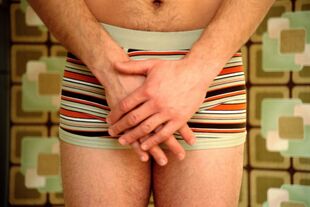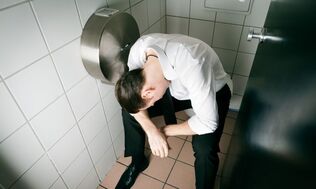Prostatitis is one of the most common urological diseases, in which the inflammatory process develops, covering the tissue of the prostate gland. Prostatitis can manifest itself in men of all ages and is often accompanied by other diseases of the reproductive system. The causes of prostatitis in men can be different, and to reduce the likelihood of contracting the disease, they should be considered in more detail.
Classification

Regarding the development of pathological processes, there are three main forms of prostatitis:
- Sharp.Symptoms appear suddenly and most noticeably. Therefore, most men with acute prostatitis go to the doctor in the first days of the open process. A typical symptom of this disease is severe back pain, which occurs against the background of an increase in body temperature to 39 degrees. Often, the cause of prostatitis is an infectious focus, which can develop in distant organs.
- Chronic.If acute prostatitis is not treated in a timely manner, the disease turns into a chronic form. It is characterized by less obvious symptoms, and the general condition of the patient can be called satisfactory. The temperature drops to normal.
- Stagnan.Non-infectious inflammatory process. It is caused by a stagnant process observed in the pelvic organs. The disease is characterized by progressive development with a gradual increase in pathological symptoms. Today, this form of the disease is very rare.
This form of chronic disease is considered very dangerous, as most men ignore the mild symptoms, delaying a visit to a specialist. With this approach, the possibility of many complications of the disease.
The disease "gets younger" over time, so it can occur at any age.
What causes prostatitis?
The disease develops in a third of men aged 20-60 years. Therefore, unlike some diseases of the genitourinary system, these diseases can not be mentioned in relation to age. There are several causes of prostatitis in men, the main ones of which will be discussed below.
Acute and chronic infections
Infectious lesions are the leading cause of prostatitis. When an infection enters the prostate, an inflammatory process develops. Often, diseases such as gonorrhea and urethritis become provocators of this form of prostatitis.
Pathological processes such as caries, tonsillitis, tuberculosis and so on can provoke the development of infectious prostatitis.
To cure this form of the disease, it is necessary to eliminate the infectious agent that is the main cause of its development. Only after the neutralization of the causative agent of the infection, prostatitis can be completely cured.
Congestion

Every man should have enough sex in his life - otherwise he will not escape problems with his prostate.
Consequences of lack of frequent sex life can be the development of congestion in the prostate. At the same time, the blood circulation in the organs is disrupted, as a result of which the secretion stops, which interferes with its function. All of these can lead to prostate deformation and the development of inflammatory processes.
Regular sexual activity helps prevent prostate secretion stagnation. Moreover, experts recommend their patients to stay away from inconvenient relationships by finding a permanent sexual partner.
Inactive work
In recent decades, there has been an acute transition trend from manual to mental labor. And this is an inactive lifestyle that is one of the leading causes of prostatitis in men.
In addition, an inactive lifestyle causes deterioration of nervous, endocrine and cardiovascular system functions. As a result, prostate gland cells lack oxygen, which leads to the creation of optimal conditions for the reproduction of pathogenic microflora.
And while inactive work is not a direct cause of prostatitis, it creates optimal conditions for prostate gland infection. Therefore, to prevent prostatitis, the body should do regular physical activity.
During an active lifestyle, a person's blood flow normalizes, the endocrine system and nerves function better. Thus, prostate gland tissue is protected from lack of oxygen.
Prolonged abstinence
If there is no frequent sexual activity, secretions get stuck in the organs. Thus, blood circulation in the prostate tissue becomes difficult. The result is the same as when living a passive lifestyle.
Oxygen starvation leads to the fact that in the tissue of the prostate gland there are favorable conditions for the reproduction of pathogenic microflora. As a result, only a weak body infection will be enough to ensure the development of prostatitis is guaranteed.
Hypothermia

Freezing is a definite way of pathological appearance.
Scientists believe that hypothermia is one of the main provocateurs of prostatitis. Prostatitis from hypothermia develops for several reasons:
- Due to hypothermia, vasoconstriction occurs, leading to poor tissue nutrition and deterioration of organ function.
- With significant body coagulation, a person's immune system becomes weak. This leads to the fact that the body becomes susceptible to various types of infectious wounds.
Hypothermia becomes very dangerous for men who have had prostatitis earlier. Even if the disease has been cured, it can recur.
To prevent the development of prostatitis, it is necessary to dress warmly in winter, to avoid sitting on cold and cold surfaces. It is forbidden to walk barefoot on a floor that is not hot enough.
Other reasons
The development of prostatitis can occur not only for the above reasons, but also under the influence of these factors:
- obesity;
- poor working conditions, where there is a strong load on the perineum area or significant tremors;
- hormonal disorders;
- ARVI is transferred to the foot;
- Chronic constipation.
The best prevention of this disease is by avoiding the above factors. People who previously had prostatitis are very susceptible to this disease.
Who is at risk
Anyone who previously had a problem with the prostate gland may face the disease again.
After considering what causes prostatitis, it is necessary to determine the group of people who are prone to its appearance. The following men are prone to prostatitis:

- lead an inactive lifestyle;
- suffers from frequent constipation;
- fat;
- engaged in inactive work;
- experiencing severe stress and hard work;
- having irregular sex or frequently changing sexual partners;
- previously had prostatitis;
- suffer from immune disorders;
- alcohol and cigarette abuse.
Developmental features in young and old
Prostatitis can develop in young people due to several factors. The main ones are: inactive work, lack of full intimate life, inactive lifestyle. To reduce the progression of the disease, you need to exclude these factors from your life.
In the elderly, the disease most often develops against the background of extinction of sexual function. With age, the reproductive system changes, as a result of which sooner or later it stops functioning. A significant decrease in fertility can be seen in men aged 45-50 years.
In addition, this can occur under the influence of hormonal changes in the body, as total testosterone production decreases. And this change is one of the main causes of prostatitis.
Causes the transition from the acute stage of the disease to the chronic
Although acute prostatitis is characterized by obvious symptoms, forcing the patient to see a specialist, the chronic form usually has no characteristic symptoms. In most cases, men do not rush to see a doctor, realizing a little discomfort. As a result, the disease develops into a more severe form.
But how does this disease become chronic? Often, poorly treated forms of acute illness cause the development of chronic processes. In this case, the transition from one form to another occurs under the influence of the following factors:
- Treatment started late.
- Ineffective therapy is given or wrong technique is chosen.
- The patient's immune response has decreased significantly.
- There is no treatment for acute prostatitis.
It should be noted that asymptomatic chronic processes of inflammatory processes sooner or later end in deterioration. Then the patient experiences all the signs of the disease, including severe pain in the perineum and lower back, difficulty urinating and inhibition of sexual function.
Chronic prostatitis has one important feature: when inflammation of the primary prostate occurs, there is a deterioration in the nervous process of this organ. This, in turn, has a very negative effect on his work, which often leads to autoimmune processes. In this case, the immune system begins to produce antibodies to prostate tissue. Therefore, even if the primary infection is eliminated, it is not possible to prevent the development of such prostatitis.
Symptoms

The main symptom of the development of prostatitis is pain. This indicates that the inflammatory process is developing in the prostate. At the same time, unpleasant sensations can have different characters and intensities. Urination causes severe pain.
The disease is very uncomfortable, in its acute stage of development. Against the background of severe pain, the patient suffers from sleep disturbances, his appearance is significantly reduced, similar to the overall quality of life.
Pain in prostatitis has the following characters:
- localized in the perineum, lower abdomen, lower back;
- radiates to the genital area;
- Unpleasant sensations increase when visiting the toilet, during arousal and in the process of ejaculation;
- is accompanied by sexual dysfunction.
Erectile dysfunction is a common symptom of chronic disease. Due to the fact that such dysfunction can have varying degrees of manifestation, then their therapy has some differences.
It is not uncommon for men to have a slow erection with prostatitis. A large number of patients are unable to complete sexual intercourse at all or ejaculate too early. Such disorders have a negative effect on sperm composition.
Methods of treatment
The specific type of therapy is determined by a specialist based on the course of the disease. In this case, the causes of the development of the disease should be taken into account. So, the main method of treating acute forms of the disease is antibiotic therapy. This medicine is taken even though the disease is not bacterial.
Complex treatment is provided for chronic prostatitis. This includes the following procedure:
- drug therapy;
- physiotherapy;
- take immunomodulators;
- prostate massage.
If chronic prostatitis has non-bacterial properties, then the treatment is done by taking non-steroidal drugs. Sedatives are used as an adjunct treatment.
Prevention of prostatitis is reduced to an active lifestyle, regular sexual intercourse with a normal partner and timely treatment of infectious diseases.
























